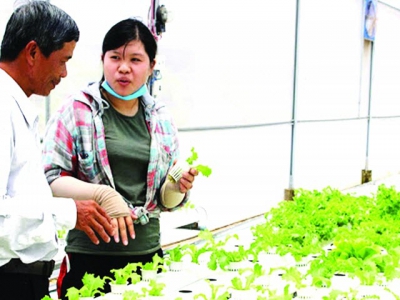Mekong Delta agriculture: Adding value by applying sci-tech

Many provinces in the Mekong Delta have applied science and technology in agricultural production to improve productivity, product quality and farmer incomes.
Many Mekong Delta provinces are applying Industry 4.0 in agricultural production
Sci-tech adds value to agricultural products
According to the Ministry of Agriculture and Rural Development, the Mekong Delta contributes 54, 90, 70 and 36.5 percent to Vietnam’s rice production, rice exports, aquaculture, and fruit production output, respectively. The region has carved a 20-percent niche on the global rice market. Provinces in the region have applied sci-tech in agricultural production to improve productivity, product quality and farmer incomes.
The city of Can Tho is taking the lead among Mekong Delta provinces in terms of sci-tech application. The city has formed a high-quality rice production chain with large fields of 100 hectares, meeting GlobalGAP (Global Good Agricultural Practices) standards, and 84ha of rice satisfying VietGAP (Vietnamese Good Agricultural Practices) standards. Can Tho has developed orchards associated with eco-tourism, meeting VietGAP standards and providing 65,000 seedlings per year.
Since 2015, An Giang Province has invested more than VND90 billion in sci-tech research and application in agriculture, including 70 provincial-level projects, 116 grassroots-level projects and 50 sci-tech application projects, half of which serve agricultural and rural development in the province in particular and the Mekong Delta in general. In addition, An Giang funded the application of smart technology in agricultural production management and automation, including reishi mushroom and melon watering, and automated monitoring of aquaculture, among others.
Hau Giang Province has been restructuring its agricultural sector toward sustainable development in the context of the Fourth Industrial Revolution or Industry 4.0. The province established a 5,200ha hi-tech agricultural park in Long My District and issued preferential policies for individual and organizational investors in the park.
According to Le Van Hoang, Director of the Long An Province Department of Agriculture and Rural Development, the province is researching and applying advanced technologies and high-quality seeds and breeds, and promoting agro-forestry-fishery production mechanization. In addition, Long An is thinking of building a hi-tech agricultural zone to restructure its agricultural sector and apply high technology to agricultural production.
Ben Tre Province has also adopted policies on mobilizing resources for sustainable development of sci-tech and agricultural production. Specifically, the province has implemented 12 coconut and five green pomelo sci-tech research projects according to value chains, the notable ones of which include coconut milk refining and packaging in the Mekong Delta, and coconut oil extraction, among others. Investment projects have made use of local raw materials to create new, high-quality products with a high added value.
Sci-tech-agricultural production connectivity
While climate change has a strong negative impact on agricultural production, sci-tech application for sustainable development of agriculture and adding value to farm produce in the Mekong Delta region has become an inevitable trend. Experts say the state needs to adopt policies encouraging businesses to invest in sci-tech application and work with farmers in produce branding.
According to Dr. Tran Cong Thang, Director of the Institute of Policy and Strategy for Agriculture and Rural Development under the Ministry of Agriculture and Rural Development, policies are needed to attract investment in sci-tech application in agriculture by increasing public investment, encouraging private investment, improving access to credit for sci-tech research, application and transfer in agricultural production.
Farmers and businesses in the region need to ensure consistent sci-tech application in all stages of agricultural production, from raw material control to market approach, and all of those stages must be compliant with specific standards. Technology application should be divided into three stages, with the first one being input material use and management (technology is applied to minimize product cost and add value to agricultural products), the second one being technology application in product harvest, and the third one being technology application in product (including raw materials and finished products) quality management. The agricultural sector, farmers, and farm produce purchasing and processing enterprises need to work with each other in all those stages if they are to ensure successful technology application and transfer in agricultural production.
Localities in the region need to have investment promotion policies for prioritized industries in which high technology is applied, share with each other information on scientific and technological research and applications, build and share the region’s sci-tech human resources databases to promote technology supply-demand connectivity, and help businesses apply transferred technology in developing new production chains and adding value to products. It is important for them to build key product chains in the region, giving priority to farm produce branding.
Related news
 Rosy signs show bright prospect for rice export
Rosy signs show bright prospect for rice export Vietnam is enjoying strong growth in both rice export volume and value, and more export chances are still ahead as some free trade agreements (FTAs) have come
 Challenges compels restructuring in agriculture
Challenges compels restructuring in agriculture Trade conflicts, climate change and epidemics may at first glance appear to be a hindrance to Việt Nam’s agricultural sector.
 Farmers switch to lemongrass cultivation
Farmers switch to lemongrass cultivation More farmers in Đắk Lắk Province’s M’Đrắk District have switched to lemongrass cultivation to adapt to climate change.